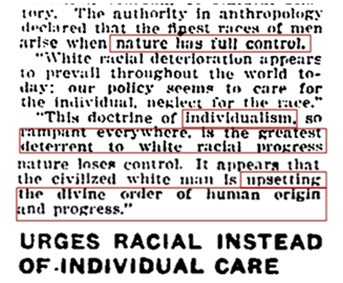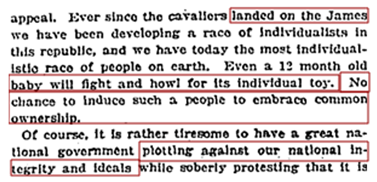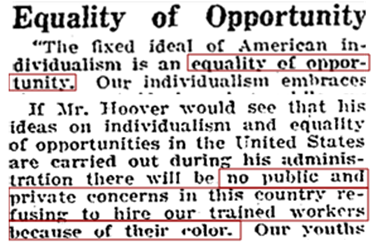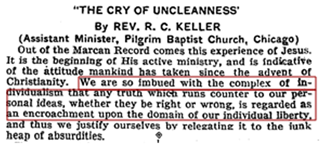Rugged Truth: Individualism in Chicago’s Prominent Newspapers throughout the 1920-1930s
by Brooke Eubanks | Xchanges 16.2, Fall 2021
Contents
Addressing the ProblemCritical Discourse Analysis and Personal ApproachManipulative SilencesBackgroundResearch MethodsEvidence and DiscussionConclusionWorks CitedAbout the Author
Evidence and Discussion
Evidence from 1930s articles on Individualism
In the discussion below, I will share images from the digital archives to help contextualize my analysis of the ways individualism was discussed in the 1920s and 1930s in both the Chicago Defender and the Chicago Tribune. According to mentions populated by respective archival databases, it shows both papers had the same number of articles including comments on individualism during the 1920s.


As for the narratives, in the 1920s Defender articles, the discourse revolves around instinct and natural processes. For example, one article reads that “the finest races of men arise when nature has full control.” Therefore, this article implies that individualism is unnatural. To be individualistic requires humanity to distance itself from its instincts; it is artificial, as defined in the Oxford English Dictionary as “[c]ontrived or fabricated for a particular purpose, esp. for deception; resulting from artifice; feigned, fictitious” (Oxford). As a result of this fabricated system, the authors of the Defender articles claim the “doctrine of individualism … is the greatest deterrent to white racial progress.” The anthropological stance emphasizes the dangers of limiting humanity––a different perspective on freedom.
In contrast, the Tribune implies that individualism is natural and provides freedom, such that “[e]ven a [12-month-old baby] will fight and howl for its individual toy. No chance to induce such a people to embrace common ownership.” The newspapers have different perceptions of human nature; the Defender aims for natural evolution and the Tribune aims for development through wealth. Tribune journalist Harper Leech write the following:
There is, in my view, only one explanation for the prosperity of America, an explanation which is to be found deep within the breast of the individual American. He understands that wealth comes from production and work, not from acts of parliament and trade union rules. (Leech)
The Tribune writes that “[e]ver since the cavaliers landed on the James we have been developing a race of individualists in this republic” and “[t]he country is individualistic to the core, and every man believes it is ‘up to him.’” The Tribune writer, Leech, demonstrates a clear-cut pathway between individualism and wealth, and collectivism and economic failure, whereas the Defender depicts these theories as artificial at best.
Leech’s perspective in the Tribune attempts to provide validity by depicting Great Britain’s perspective, who through a colonial empire represents world power. In Britain’s perspective, he notes that “America becomes more individualistic, as we become more ‘collectivist,’ and as a natural and inevitable consequence America becomes wealthier as we become poorer.” The validity is sourced by presenting the United States’ individualism as the primary world’s economic role model. This statement manipulates its validity by relying on assumptions but treating the assumptions as principles. Thus, the argument is fallacious. The fallacy contains manipulative silences working to maintain the dominant cultural ideal.
Furthermore, the human nature narrative is not absolved from spiritualism. The Defender claims that “[t]he civilized white man is upsetting the divine order of human origin and progress.” Between the lines, the Defender implies a difference between the understanding of cultural backgrounds and practice; therefore, pointing to hypocrisy and artificiality. The discussion of intention and implicature is grounded in the idea of “‘sincerity’ or ‘truth’ [being] culturally relative and dependent on local ideologies” (Johnstone 236). The culturally relative ideologies included Creationism. The Tribune does not use Creationism as evidence for individualism, which generally aligns with right-leaning politics. Thus, the Defender implies there is a misunderstanding of Creationism or manipulative silence (in terms of religion) to best fit the artificial, economic system.
Relevant to the intervention on the side of those with less power, the Defender tries to offer a solution to the artificial, economic system, such as “URG[ING] RACIAL INSTEAD OF INDIVIDUAL CARE.” According to Oxford English Dictionary, ‘Racial’ may refer to a social meaning: “[a]rising from or relating to ethnicity or difference in race” or a biological meaning: “[o]f, relating to, or characteristic of a race of animals, plants, or other organisms (e.g. a particular strain of a pathogen).” Considering their comments on human nature and equality, it can be assumed the latter definition is implied; thus, the marginalized view emphasizes an ethical system based on utilitarianism. Their narrative directly opposes individualism, so they are part of the counterculture.
Their narrative is strengthened by discussing hypocrisy, specifically that of conservatives and the Republican president, Herbert Hoover. Hoover and individualism stand for “Equality of Opportunity.” However, the Defender claims that minorities are excluded from the supposed positive implications of individualism, such as freedom, impartiality, and opportunity, which is now spoken of as systemic racism. They are not equal; equality is defined as “[t]he condition of having equal dignity, rank, or privileges with others; the fact of being on an equal footing” (Oxford English Dictionary). Thus, the “equality of opportunity” is manipulated to fit the narrative of those in power and becomes a fallacy. The fallacy contains manipulative silences working to maintain the dominant cultural ideal. It deliberately excludes marginalized peoples, concealing the truth behind the phrase, failing to ask equality for whom. The silenced definition in the dominant culture is equal opportunities for white men, thus “public and private concerns in this country [refuse] to hire trained workers because of their color” (Defender).
The Tribune articles, generally, are prideful in claiming that individualism is rooted in tradition and are therefore the sole principle of the socio-economic state. As the Tribune speaks on tradition, wealth, and freedom in the 1920s, the Defender presents these benefits as exclusionary for privileged people and deems the practice as anti-human nature. Thus, as a product of the conflicting discourse of the time, the Defender articles present as an argument against the fallacies discussed in the Tribune. The Tribune’s fallacies depend on manipulative silences, which exclude marginalized people.
Evidence from 1930s articles on Individualism
Through my archival research, I learned there was a considerable increase in articles discussing “individualism” in the 1930s from the previous decade. Granted, the Tribune’s 2,684 articles mentioning “individualism” in the 1930s includes reprints from other newspapers. With 2,665 more Tribune articles discussing individualism in the 1930s, it is implied that the individualist narrative’s significance is exaggerated. Through exaggeration, the Tribune manipulated the importance of individualism in political, social, and economic discourse. Though this is telling of the intended manipulation, the evidence within the print media reveals how the narrative works.


As mentioned above, individualism is presented as a traditional American value that conflicts with the Defender. Tribune writer Stephen A. Day writes that “foreign philosophy must stop.” In writing this, he recognized how foreign philosophies threatened the dominant culture’s rugged individualism during the cultural trauma of the Great Depression. Print media affords him control over the dominant culture, political, and economic discourse.
In the 1930s articles, the Defender attempts to disclose manipulative silences by exposing historical myths. To break these manipulated silences, they include a segment to rewrite history (bolding for emphasis, not from original article):
When the American revolutionists [rewrite] history, however, they will [dispel] this ‘scared’ and obscuring aura. They will write of the maximum wage law of two shillings a day that was introduced but one year after the revolution in ‘76. They will write of the early conspiracy laws that were utilized to break strikes: there were many strikes in the golden, democratic days. They will tell of the bayonetted militia sent against picket lines in the days of Washington and Jefferson. Searching back long before that merchant struggle for the free market (which has been called the American revolution), the working class will find its heritage: struggle and solidarity: their bones in prisons, their blood soaked deep in the American soil. (qtd. from “An American Tradition”)
By analyzing the discourse in the Tribune articles, I found that there is no evidence of a similar depiction of American history from the Defender. The source of the intention behind the manipulative silences in dominant history cannot be traced to a single encounter, but it is concluded that the Tribune’s articles maintain the dominant cultural narrative. In terms of the bolded phrases, these contradict individual freedom by putting limits on the collective. As a result, “individualism” is born out of violence against collectivist human nature and American roots. This contradicts the Tribune’s arguments on human nature and principle, such as “[t]he trend of events today is distinctly away from the sound economic principles upon which America was built” (Day, 1933) and “[e]ven a [12-month-old] baby will fight and howl for its individual toy. No chance to induce such a people to embrace common ownership” (1925). Therefore, the Tribune represents that individualism is a conditioned, traditional value for privileged people. The discourse on individualism functions on silences to maintain a narrative, which exempts historical truths about marginalized people, like the working class.
To tie President Hoover back into the discussion, these 1934 statements echo the arguments made in “Equality of Opportunity” (1929) in the Defender on President Hoover’s side, which says, “[t]he fixed ideal of American individualism is an equality of opportunity,” and “[individualism] is opposed to government interference of individual freedom” (Day). Individualism is associated with the free market (small business), fairness, and freedom, such that “[i]t is the theory of government in which the free initiative of the citizen is paramount” (Day). However, the Defender’s 1920s and 1930s narrative claims that freedom and fairness do not include working-class people nor people of color; for example, “public and private concerns in this country [refuse] to hire trained workers because of their color” (1929) and the passage written by Adler (above).
Due to the conflicting discourse of the time, the Defender develops an argument against the dominant historical narrative and benefits of individualism, such as the social, political, and economic ones presented as absolute truth in the Tribune. The Defender may not intend to directly argue against the Tribune; however, the provision of evidence for conflicting histories and experience implies that the Defender intended to rework the original historical narrative. The manipulative silences of the United States’ history propel an inaccurate historical narrative in the media. Manipulative silence is a tool used by the dominant culture to propagate the necessity and importance of individualism.
 Download PDF
Download PDF





